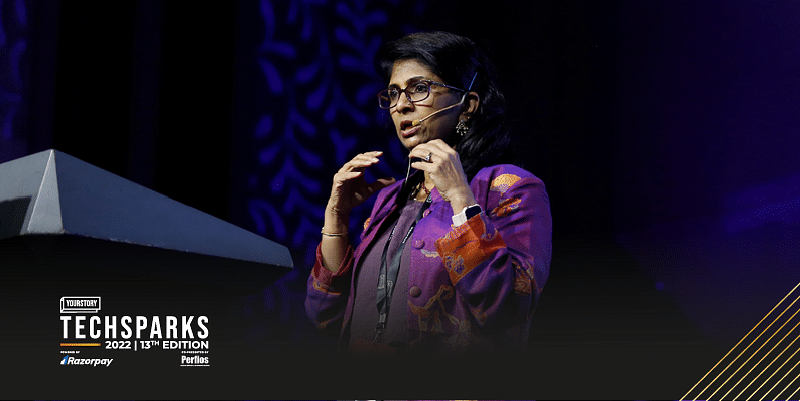Prominent in the startup ecosystem, Vani Kola, Founder and Managing Director of Bengaluru-based Kalaari Capital hardly needs an introduction. Several participants gathered to listen to her insights on the obstacles ahead of startups going public on Day 2 of TechSparks 2022—YourStory’s flagship startup tech event.
She kicked off the talk with an anecdote. Vani asked the audience if they hit any potholes en-route while travelling to the event. “At least one I am sure. And that didn’t deter you from coming here, did it?” she said.
An eternal optimist and with a logical approach at her core, she shared a personal belief that several companies will go public from Bengaluru—the startup capital of the nation. She also discussed potential pitfalls along the way and how to overcome them in the path to going public.
According to Vani, setbacks are an important part of the journey of going public. “What is important is how fast are you going to react,” she said, adding that these outcomes may not be as random as they seem.
While luck is important, it may not be unfounded that two similar ideas have two entirely different paths of success. “I see lot of optimism about the opportunity, which is essential indeed, but I hardly hear founders talk about handling setbacks is one of their strengths,” she said.
To her, the power of an idea and an entrepreneur’s zeal are celebrated because these factors that inevitably overcome many hurdles along the way.
Point blank, Vani said that valuation was a sour note. “Time and again, I have seen valuation derail the mission and purpose of why the founder started the company in the first place,” she said.
In a bid to chase hefty valuations, founders often lose sight and make it their holy grail. “How much are or your company is worth is a wrong question to answer,” she said. To her, the scale and scope of the idea and its impact is what matters the most. “Just raise the money and keep building,” she added.
On planning, well
Vani explicitly urged the founder fraternity to embrace business continuity planning (BCP) especially when things are going well. She highlighted that founders are more inclined to prepare for the best case scenario and rarely prepare for the worst. “The preparation for the worst-case scenario is a founder’s responsibility,” she opined.
To her, the worst-case scenario can be factored in by the founder and institutionalised in these firms by them. On disputes, Vani sees alignment as the KRA for key leadership. “If you are not going to drive that as the key value down the organisation then you are stretching the fabric of your success,” said Vani, hihglighting that having a system in place to manage conflicts is critical, especially in the inception of a company’s journey.
Dealing with burnout
Being a founder often implies being in the game for the long haul. “Staying in the game is important and not burning out,” Vani said. “Always optimise for longevity,” she added.
For founders, it takes time to prove their idea and more importantly prove themselves. “Staying in the game is important and not burning out,” Vani said. “Always optimise for longevity,” she added. Vani said point blank that she wasn’t a proponent of the build or burnout model, and that metaphors surrounding “build or go home” were overrated. “As the founders of your startups what is the point in going home,” she asked, adding that founders should focus on sustaining and optomising their businesses.
Learning to fundraise
“You must learn how to fund raise,” said Vani. “Investors may knock on your doors, but that doesn’t mean that you’ll find the cheque in your mailbox.”
In Vani’s view, it is a myth that investors will line-up if a founder is doing well. Founders have to make fund raising their top KRA, even if they do not like doing it. “If not you, there is no one who will do it,” she pointed out.
Fundraising is founders’ responsibility and obligation, and they must learn to get good at it. “You can if you set your mind to get good at it,” Vani said encouragingly.











